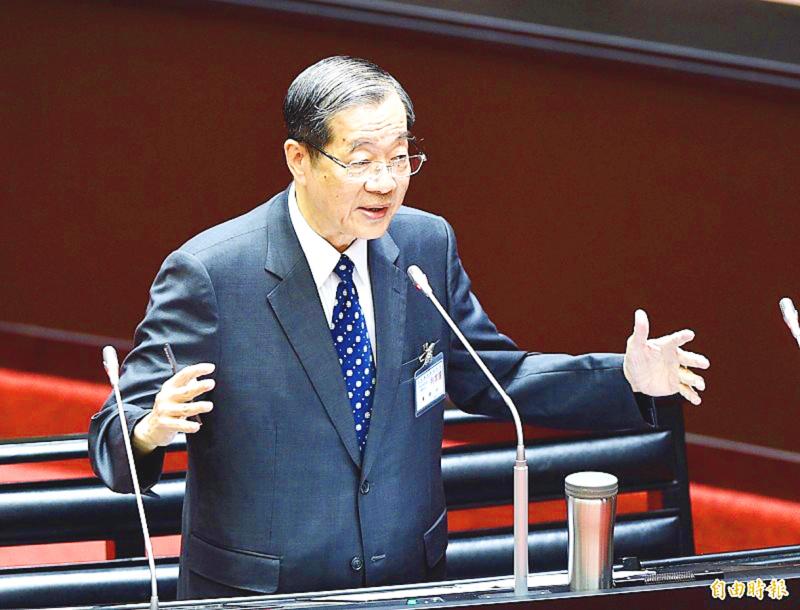Former minister of education Huang Jong-tsun (黃榮村) yesterday told lawmakers that he would support any effort to move the nation toward a sounder constitutional system, including abolishing the Examination Yuan, if he were to be confirmed as its head.
Huang, who was nominated by President Tsai Ing-wen (蔡英文) to be Examination Yuan president, made the remark as the Legislative Yuan in Taipei reviewed his nomination.
Abolishing the Examination Yuan and the Control Yuan has been advocated by many people for a long time, and he would support any effort aimed at boosting the government’s efficacy and improving the nation’s constitutional system, Huang said in his speech.

Photo: Peter Lo, Taipei Times
If the decision was made to abolish the Executive Yuan, he would not seek to cling to his post, but would draft measure to phase it out, while ensuring that its functions of designing civil service entrance tests and evaluating civil servants’ performances be continued, he said.
Traditional paper tests alone cannot meet the needs of society and the government for capable civil servants, so he would take into account the challenges civil servants would encounter on their jobs, their mobility between different fields and whether they have an international perspective, he said.
He would evaluate the need for a two-step entrance test process for civil engineers and other professions concerned with public safety by requiring them to obtain a general license before passing specialized tests administered by professional associations, he said.
The single-track testing system for civil servants, researchers and teachers is no longer “appropriate,” he said, adding that the rules should be amended to separate the testing of the three professions, which would improve the nation’s competitiveness.
During a question-and-answer session with Democratic Progressive Party Legislator Wang Ting-yu (王定宇), Huang was asked whether he would support the inclusion of Taiwanese history as a subject in civil service tests.
Civil servants handling Hakka or Aboriginal affairs are required to take tests on Hakka and Aboriginal history, but those testing for positions in other agencies are not required to be tested on the nation’s history, Wang said.
If civil servants are familiar with the nation’s history, it would significantly benefit their jobs and the nation’s development, he said.
A civil servant concerned with building roads or dams could not do their job well if they did not know the history of a locality, he said.
Huang said that he supports including tests on the nation’s history if the responsibilities associated with a position would benefit from such a move, adding that he would look into the matter.
Taiwanese history could also be included as part of the training program for newly hired civil servants before they are assigned their first jobs, he added.

CAUTION: Based on intelligence from the nation’s security agencies, MOFA has cautioned Taiwanese travelers about heightened safety risks in China-friendly countries The Ministry of Foreign Affairs (MOFA) yesterday urged Taiwanese to be aware of their safety when traveling abroad, especially in countries that are friendly to China. China in June last year issued 22 guidelines that allow its courts to try in absentia and sentence to death so-called “diehard” Taiwanese independence activists, even though Chinese courts have no jurisdiction in Taiwan. Late last month, a senior Chinese official gave closed-door instructions to state security units to implement the guidelines in countries friendly to China, a government memo and a senior Taiwan security official said, based on information gathered by Taiwan’s intelligence agency. The

Taiwan Semiconductor Manufacturing Co (TSMC), the world’s largest contract chipmaker, said yesterday that it is looking to hire 8,000 people this year, at a time when the tech giant is expanding production capacity to maintain its lead over competitors. To attract talent, TSMC would launch a large-scale recruitment campaign on campuses across Taiwan, where a newly recruited engineer with a master’s degree could expect to receive an average salary of NT$2.2 million (US$60,912), which is much higher than the 2023 national average of NT$709,000 for those in the same category, according to government statistics. TSMC, which accounted for more than 60 percent

Tung Tzu-hsien (童子賢), a Taiwanese businessman and deputy convener of the nation’s National Climate Change Committee, said yesterday that “electrical power is national power” and nuclear energy is “very important to Taiwan.” Tung made the remarks, suggesting that his views do not align with the country’s current official policy of phasing out nuclear energy, at a forum organized by the Taiwan People’s Party titled “Challenges and Prospects of Taiwan’s AI Industry and Energy Policy.” “Taiwan is currently pursuing industries with high added- value and is developing vigorously, and this all requires electricity,” said the chairman

‘POOP ON STAGE’: The song, which talks about the reluctance to graduate and anxiety about a lack of job opportunities, resonated with many students’ feelings The original song Poop on Stage has been chosen as National Taiwan University’s (NTU) graduation song this year, sparking much debate regarding the song’s title and content, which describes students’ anxiety about post-graduation unemployment. The title, Shang Tai Da Bian (上台大便), is a play on words that literally means “go on stage to poop.” The first three characters, shang tai da (上台大), also mean “to attend NTU,” as “Taida” is a common abbreviation for the university. The last character, bian (便), can mean “convenient” or “then,” but is more commonly associated with defecation. The lyrics of the song describe students’ reluctance to graduate and